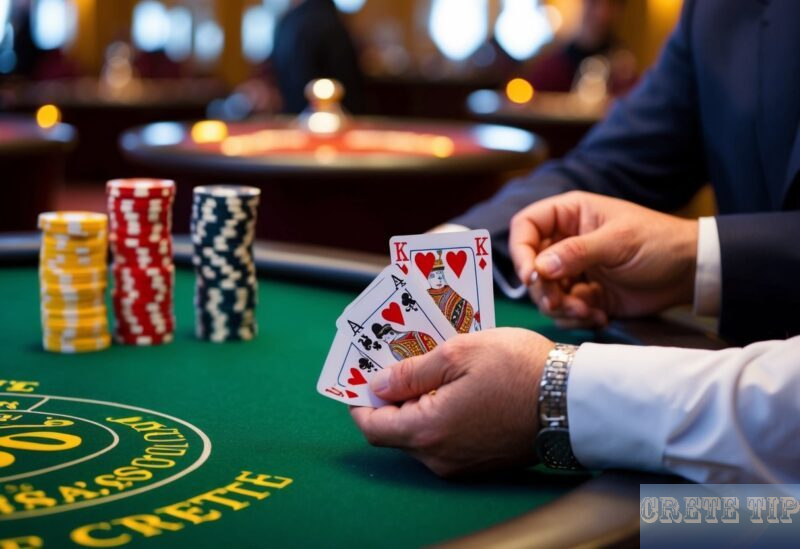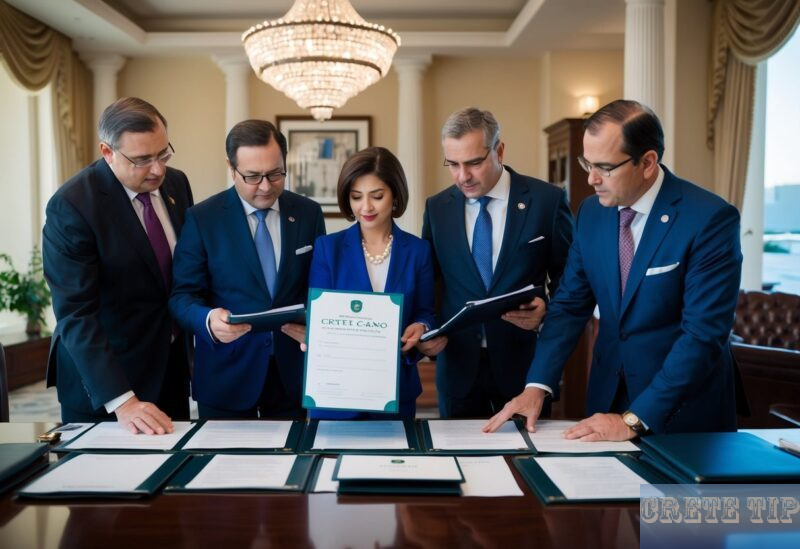Crete casino in planning – Regulatory steps for Cretan casino licensing.

The Greek island of Crete is poised for significant changes as plans for a new casino development move forward. This marks a notable shift in the island’s tourism and entertainment landscape, potentially bringing new economic opportunities to the region.
The licensing process for the casino project is set to begin, signalling progress on an initiative that has been in discussion for some time. As Crete prepares for this new venture, locals and officials alike are considering the potential impacts on the island’s economy and culture.
Casino Licensing Process Begins in Crete
The Hellenic Gaming Commission (HGC) is set to launch the licensing process for a new casino in Crete. This exciting development follows the recent allocation of land for an Integrated Resort Casino (IRC) in Gournes, Heraklion, by REDS, the property development company.
REDS has proposed a comprehensive plan for the 345,000 square metre site, dividing it into three distinct zones. The casino and IRC activities will be situated in the central area, known as Plot I. This zone will feature not only the casino but also a conference centre, sports facilities, dining options, and recreational areas.
The development will also include a shopping and leisure area in the southern section (Plot II), comprising retail spaces, restaurants, and entertainment venues. The northern part of the property, facing the sea, is earmarked for tourism and recreation. This area will host 4 and 5-star hotels, luxury villas, and additional leisure facilities.
Despite the vast size of the property, the buildable area is limited to 60,000 square metres, with a maximum building height of 10.75 metres. REDS plans to demolish all existing structures on the site. The total investment for this project is expected to exceed €250 million.

The casino licensing process will mirror the approach used for the Hellinikon project in Athens. REDS will outline the operational terms for the casino, after which interested parties will be invited to submit their bids.
Before the official tender, the HGC will conduct an informal consultation with potential investors. This will involve circulating a teaser document to gauge market interest in the casino licence.
Several domestic and international businesses, including companies from France and Israel, are rumoured to be interested in bidding for the Gournes casino licence.
Some thoughts on the casino project on Crete

The casino project in Crete has garnered significant attention from various stakeholders. Local businesses are keen to understand how this development might impact tourism and the regional economy. Environmental groups have expressed interest in the project’s potential effects on the coastal area.
Investors are closely monitoring the licensing process, as the Cretan casino represents a major opportunity in the European gaming market. Industry analysts are comparing this development to similar projects in other Mediterranean destinations.
Legal experts are examining the regulatory framework surrounding the casino licence, particularly in light of recent changes to Greek gambling laws. Urban planners and architects are discussing the project’s potential to transform the Gournes area and set new standards for integrated resort design in Greece.
The tourism sector is debating how the new casino might affect visitor demographics and spending patterns in Crete. Some argue it could attract a more affluent clientele, while others worry about potential social impacts.
Economists are analysing the project’s potential contribution to local employment and tax revenues. They are also considering its role in diversifying Crete’s tourism offerings beyond traditional sun and sea holidays.
The licensing process is expected to be competitive, with several major international casino operators likely to participate. Industry insiders are speculating about potential partnerships between Greek and foreign companies to strengthen bids.
Transport authorities are reviewing infrastructure needs, considering how to manage increased visitor numbers to the Gournes area. This includes potential upgrades to roads and public transport links.
Local residents have mixed views on the casino development. Some welcome the economic opportunities, while others are concerned about changes to their community’s character.
Educational institutions are exploring the possibility of developing training programmes to prepare local workers for jobs in the casino and hospitality sectors. This could include courses in hotel management, gaming operations, and customer service.
Real estate experts are predicting how the IRC might affect property values in surrounding areas. Some anticipate a significant boost to the local property market.
Security specialists are advising on best practices for casino operations, focusing on measures to prevent money laundering and ensure responsible gambling.
The Greek government views the Cretan casino as part of a broader strategy to enhance the country’s tourism infrastructure and attract high-spending visitors. Officials are emphasising the project’s potential to create year-round employment opportunities.
Environmental consultants are working on impact assessments, looking at ways to minimise the development’s ecological footprint. This includes strategies for energy efficiency and water conservation.
Marketing professionals are discussing how the new casino might be promoted internationally, potentially positioning Crete as a luxury gaming destination to rival established European hotspots.
Technology firms are proposing cutting-edge systems for casino management and security, highlighting the opportunity to create one of the most advanced gaming facilities in the Mediterranean.
Health and safety experts are advising on protocols for the casino and resort, particularly in light of recent global health concerns affecting the hospitality industry.
Financial analysts are projecting potential revenues from the casino and assessing its likely contribution to Greece’s tourism sector. They are also examining how it might affect existing casinos in other parts of the country.
Cultural heritage specialists are considering how the new development might incorporate elements of Cretan history and tradition, ensuring the resort maintains a strong local identity.
Sustainability consultants are proposing ways to make the IRC a model of environmentally responsible development, potentially setting new standards for the Greek tourism industry.
Common Questions About Casino Licensing in Crete

What Steps Are Required to Obtain a Casino Licence in Crete?
The process to get a casino licence in Crete involves several steps:
- Submit an application to the Hellenic Gaming Commission
- Provide detailed business plans and financial projections
- Pass background checks for all key personnel
- Demonstrate sufficient capital and financial stability
- Meet technical and operational requirements
- Undergo site inspections and audits
- Pay required fees and taxes
Applicants must be prepared for a thorough vetting process before approval.
Which Body Oversees Casino Licensing in Crete?
The Hellenic Gaming Commission is the primary regulatory authority for casino licensing in Crete. This government agency manages all aspects of gambling oversight, including:
- Reviewing licence applications
- Conducting background investigations
- Enforcing regulations and standards
- Issuing licences and permits
- Monitoring ongoing casino operations
The Commission works to ensure fair and legal gambling practices throughout Greece.
What Legal Requirements Must Be Met to Run a Casino in Crete?
To operate a casino legally in Crete, several key prerequisites must be satisfied:
- Registration as a legal business entity in Greece
- Clean criminal record for all owners and key staff
- Compliance with anti-money laundering regulations
- Adherence to responsible gambling policies
- Implementation of strict security measures
- Regular financial audits and reporting
- Payment of all required taxes and fees
Meeting these criteria helps maintain the integrity of Crete’s casino industry.
How Long Does It Typically Take to Get a Casino Licence in Crete?
The timeline for obtaining a casino licence in Crete can vary, but generally takes 12-18 months. Factors affecting the duration include:
- Completeness of the initial application
- Complexity of the proposed casino project
- Time required for background checks
- Any requests for additional information
- Current workload of the licensing authority
Applicants should be prepared for a lengthy and detailed review process.
Are There Specific Financial Requirements for a Casino Licence in Crete?
Yes, there are strict financial criteria for casino licences in Crete:
- Minimum capital investment of €500 million
- Proof of financial stability and liquidity
- Detailed revenue projections and business plans
- Guarantees of funding for ongoing operations
- Ability to pay licensing fees and taxes
- Evidence of responsible financial management
What Recent Changes Have Been Made to Casino Licensing Rules in Crete?
Recent amendments to Crete’s casino licensing regulations include:
- Increased minimum investment requirements
- Stricter background check procedures
- Enhanced responsible gambling measures
- New environmental impact assessment rules
- Updated tax structure for casino revenues
- Expanded options for integrated resort developments



